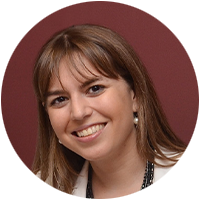Inês Laíns, MD | Portugal Clinical Scholars Research Training
 Inês Laíns, MD is a research fellow at Massachusetts Eye and Ear (MEEI) and a medical graduate from the University of Coimbra in Portugal. She is currently enrolled in a PhD program at the University of Coimbra and her work is supported through a scholarship from the Portuguese Foundation for Science and Technology (FCT).
Inês Laíns, MD is a research fellow at Massachusetts Eye and Ear (MEEI) and a medical graduate from the University of Coimbra in Portugal. She is currently enrolled in a PhD program at the University of Coimbra and her work is supported through a scholarship from the Portuguese Foundation for Science and Technology (FCT).
In 2014, Inês Laíns was awarded the Junior Grant and Career Development Award from the Portugal Clinical Scholars Research Training Program allowing her the opportunity to come to MEEI. Under the mentorship of Dr. Joan W. Miller and Dr. Deeba Husain, she is currently studying age-related macular degeneration (AMD) and imaging of retinal and choroidal diseases. Her main project is a multi-site study on biomarkers of AMD.
What attracted you to the program? Was it that it was from Harvard? A clinical research program? Both?
The Harvard name is an assurance of quality and of course that played into my initial interest in the program. However, more than anything, I think it was the way the program announcement email was written. There was a line that described the course as for people interested in ‘rigorous training in clinical research.’ That intensive training was exactly what I needed at the time.
In Portugal, I participated in a small research project and while I was very excited about clinical research, I knew very little about how to actually do it. I felt the Portugal Clinical Scholars Research Training program would meet my training needs, but now I realize that at that time I actually did not have a full sense of how much I would gain from the program.
What parts of the curriculum stood out to you?
The entire curriculum completely exceeded my expectation. Each learning module taught me something that I have put into practice over the past three years of my career. From the first workshop I knew the program was something special. We were asked to form teams with five people that we had never seen before and given two hours to prepare a presentation. As you might imagine, it is extremely challenging to move from strangers to teammates in such a short amount of time. However, the teamwork exercise is extremely important as it mirrors what we face in our professional lives. We may not have to engage so quickly, though working on a cross-functional team with people from different training background and levels of experience is central to clinical research.
I studied biostatistics in med school, but I did not have the proficiency to put anything into practice. In theory I knew a few things, but I did not feel confident or comfortable enough to create a database and perform statistical analyses by myself. After the two years of training, I felt completely confident in my abilities. Of course I still have questions and need to ask for help, but I am able to perform my own analysis and discuss it in detail with the biostatisticians in my lab. The knowledge gained during the course allows you to read science in a completely different way. Now when I read papers I look at the methods, results, how data are presented and analyzed much more critically.
I think the program covers everything you need to know to start conducting high quality clinical research.
The program also gave me a very strong foundation in how to properly design a research study starting from the very beginning with how to create an appropriate research question. Knowing how to ask the right question and how to establish the objectives in our hypotheses is extremely important. If our foundation is not correct we run into trouble along the way. Not only in terms of design, but how to calculate the sample size, how to plan, how the study should go, and how we should conduct our analysis.
Everything I learned during PTCSRT is exactly what I needed to be able to do high quality clinical research from the beginning to the end. From planning to properly presenting your results, to securing funding, designing your study, analyzing your data — I think the program covers everything you need to know to start conducting high quality clinical research.
Did the course accelerate your move into clinical research, or shift your focus completely?
It changed completely. When I received the course announcement, I was starting my residency and extremely interested in becoming a good ophthalmologist, a good clinician. I was curious about research, but I didn’t have a real passion for it. That passion developed during the PTCSRT course, and it was what motivated me to apply for a PhD program (which I joined) and to later on apply for the Junior Grant and Career Development Award. This grant ended up funding my project and it allowed me to come to Boston.
In theory I was coming for one-year, but my research opportunities started growing along with my passion for the work. Now I’ve been here for three years, completely dedicated to research with my residency on hold. Since January we have published 10 papers on this project, two of them in the best two journals of ophthalmology. So yes, the program completely changed my life.
Learn more about Portugal Clinical Scholars Research Training.
Written by Chike Lawrence-Mitchell